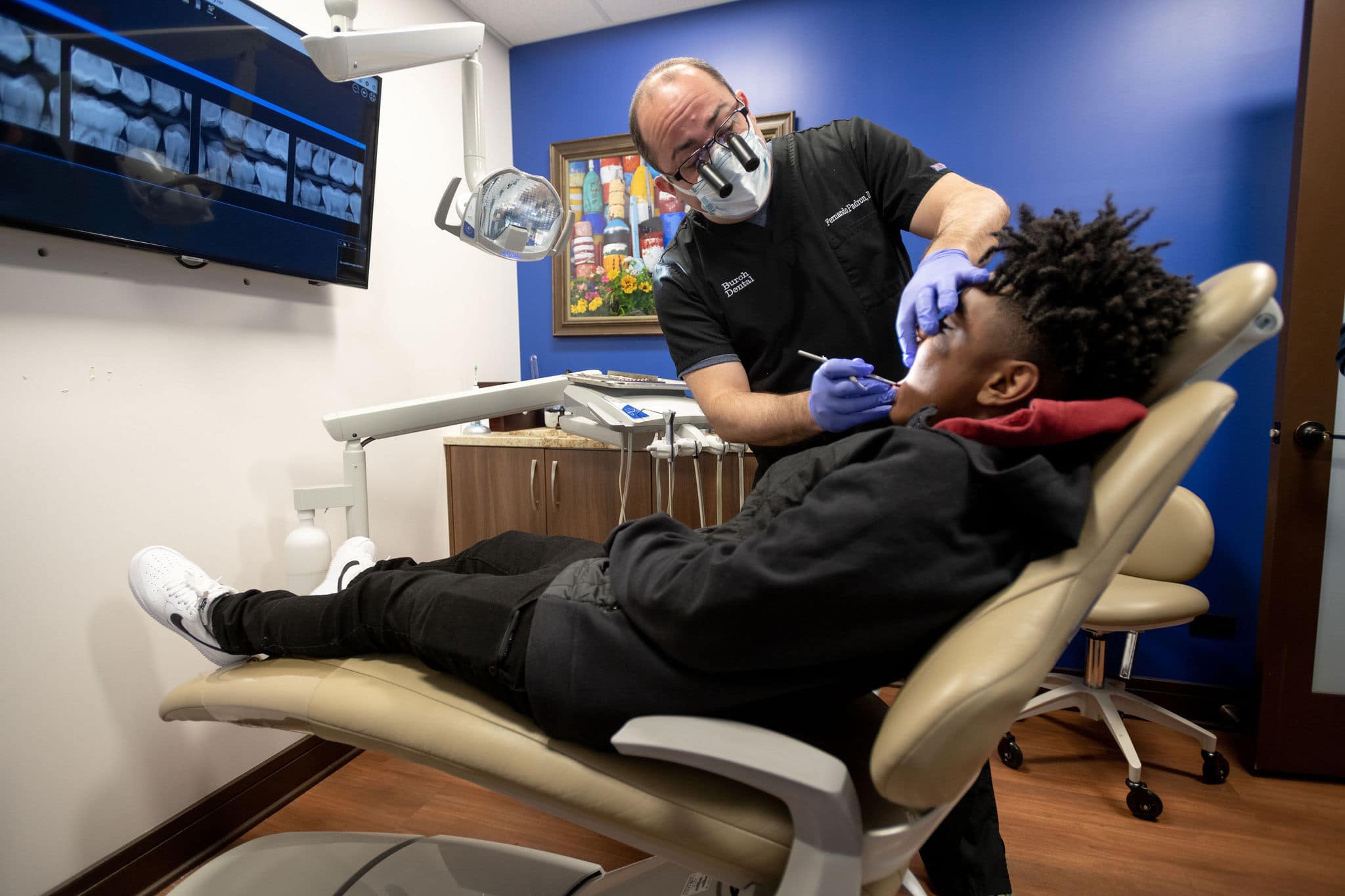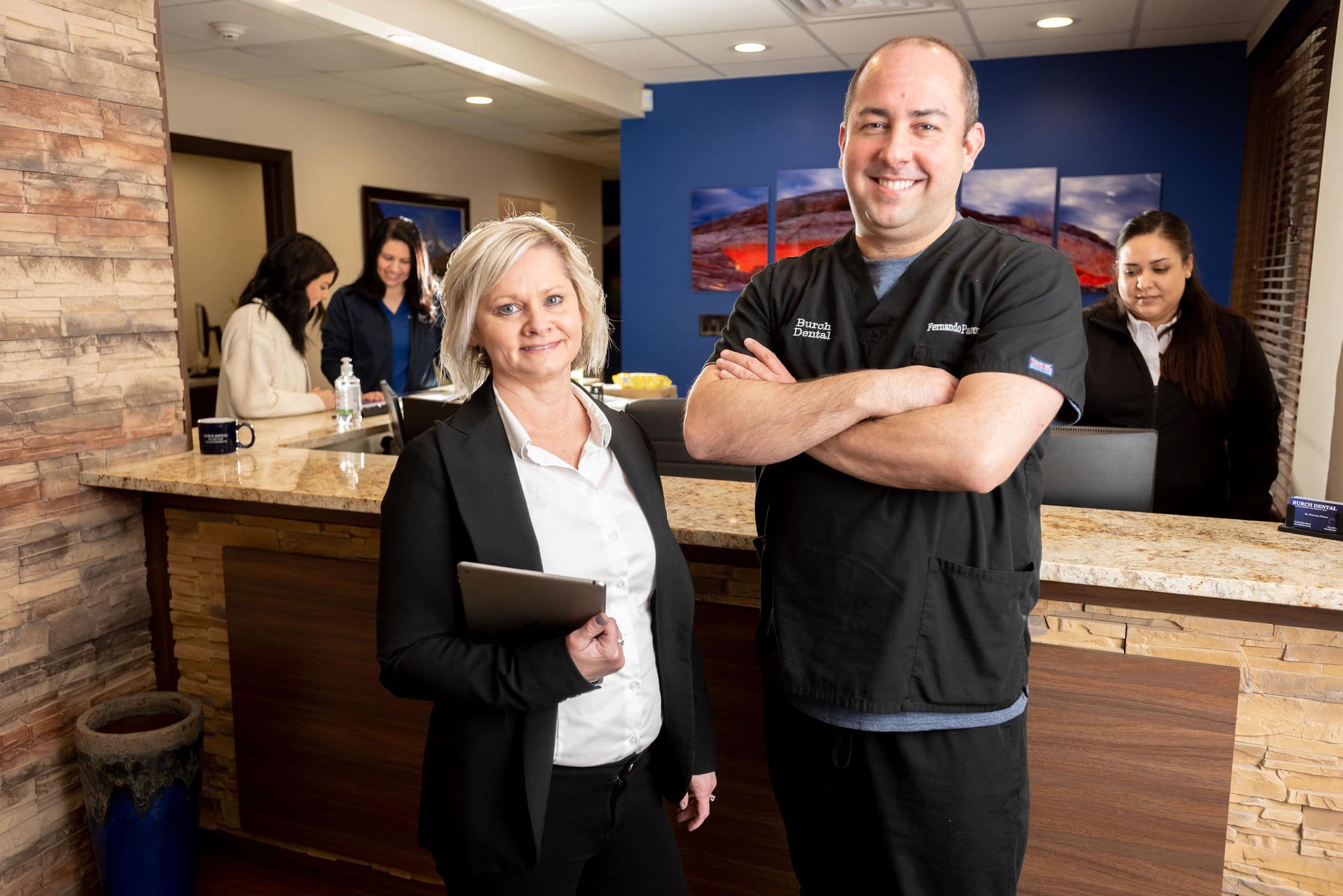Tooth Extractions
Rockford & Loves Park, IL
Tooth Extractions
Rockford & Loves Park, IL
Extractions are performed for a variety of reasons, but most often to remove a tooth which have become unrestorable through tooth decay, periodontal disease, or dental trauma.
A dental tooth extraction is the removal of a tooth from the dental alveolus, socket, in the alveolar bone. Extractions are performed for a variety of reasons, but most often to remove a tooth which have become unrestorable through tooth decay, periodontal disease, or dental trauma. Impacted wisdom teeth can cause infections and may need to be removed. In orthodontics if the teeth are crowded, healthy teeth may be extracted to create space so the rest of the teeth can be straightened.
Americans over the age of 65 still have a few, if not all their natural teeth. With new advances in the dental industry, patients of all ages have many new ways of keeping their natural teeth clean and free of bacteria and decay. However, in some cases, no matter how hard we try, our teeth become infected and need to be treated immediately.
The team at Burch Dental has a simple goal. That is to ensure your trust through our commitment to quality treatment and your continued satisfaction. It is our daily agenda to maintain a caring environment that is respectful and comfortable for everyone. Our team members are united in our efforts to promote oral health by means of prevention, enhancement, wellness, and rejuvenation. Call or visit one of our convenient locations today to schedule your appointment for an evaluation to determine if you might benefit from a tooth extraction.
When Is Tooth Extraction Necessary?
In many cases, we can repair a tooth that is broken or damaged by decay with a filling, crown, or other dental treatment. Sometimes, the damage is too severe to repair, and Burch Dental will recommend a tooth extraction.
Here are some other reasons tooth extraction might be necessary:
- Decay or infection- Inside every one of our natural teeth, there is a soft tissue that is connected to the nerves of our tooth, called the pulp of the tooth. When the tooth becomes damaged and it starts to decay into the tooth’s pulp, the pulp becomes infected. When the pulp becomes infected or damaged, it can cause some serious toothaches and sharp pains in your tooth. Often these infected teeth can be saved by our team by performing a root canal therapy.
- Trauma or injury- Accidents happen, and when an accident happens involving a tooth it can cause extreme pain. Burch Dental can repair damaged teeth by using a filling to fill in the cracks or fractures that were caused by the trauma. The cracks need to be filled to prevent any infection from starting and spreading, and to prevent any decay. If a filling will not suffice, we may use a dental crown. A dental crown is used to cover the entire surface of the tooth above the gum line. When neither of these options help prevent decay from spreading, our team has no choice but to extract the tooth to prevent further damage to the tooth and the surrounding teeth as well.
- Gum Disease- One of the leading causes of natural tooth loss is periodontal disease. This is a gum disease that causes the gums to slowly detach from the teeth when there is an excessive amount of plaque or tartar build up around the gum line. The gums start to pull away from the teeth that create pockets of empty space that become infected. This is when you will start to notice your gums becoming extremely swollen, red and bleed often. If left untreated, the connectivity tissue that holds onto your teeth will start to lose its grip on your teeth because of the bacteria. In extreme cases, your teeth will start to loosen up and Burch Dental may need to extract them to eliminate the pain. Orthodontic treatment might require tooth extraction to create room for the teeth as they move into place.
- Wisdom Teeth- Wisdom teeth erupt in our late teens or twenty-something age. In most cases, wisdom teeth grow in crooked and start pushing your other teeth in different directions, causing a misalignment. Burch Dental removes wisdom teeth all the time, whether they are grown in or are still underneath the gum line, we can remove them simply or surgically. It is recommended to have your wisdom teeth pulled out before they start growing in and causing problems. Even if your wisdom teeth are fully grown in and have caused you no problems to date, they may cause you trouble in the future as they are the hardest teeth to clean and they become more susceptible to infection in your thirties and forties.
- Lack of Space- Orthodontic treatment might require tooth extraction to create room for the teeth as they move into place.
Preparation for a Tooth Extraction
Before removing a tooth, Burch Dental will thoroughly review your medical and dental history and take the appropriate X-rays. X-rays reveal the length, shape, and position of the tooth and surrounding bone. From this information, we can determine the best way to remove the tooth.
Before removal during a simple extraction, our team will numb the area around your tooth using a local anesthetic. During a surgical extraction we may find it beneficial to administer intravenous (IV) anesthesia, which can range from conscious sedation to general anesthesia, which will put you to sleep. In this case it will be necessary for someone to drive you home after the procedure.
Tooth Extraction Procedures
- Simple Procedure- Using a local anesthetic to numb the surrounding area, our team will likely loosen up your tooth and simply pull it out using a tool called an elevator. This procedure is done when the tooth that needs to be extracted has grown well above the gum line for easy access. We will use dental tools to loosen the tooth and lift it up and out of the gum line for a clean extraction.
- Surgical Procedure- A surgical extraction is a more complicated procedure as it requires us to cut into the gum line to retrieve the tooth. This is usually needed during a wisdom tooth extraction or if a tooth is broken well below the gum line. A local anesthetic will eliminate any discomfort felt during these types or extractions. We can discuss a dental sedation to address your anxiety as well.






